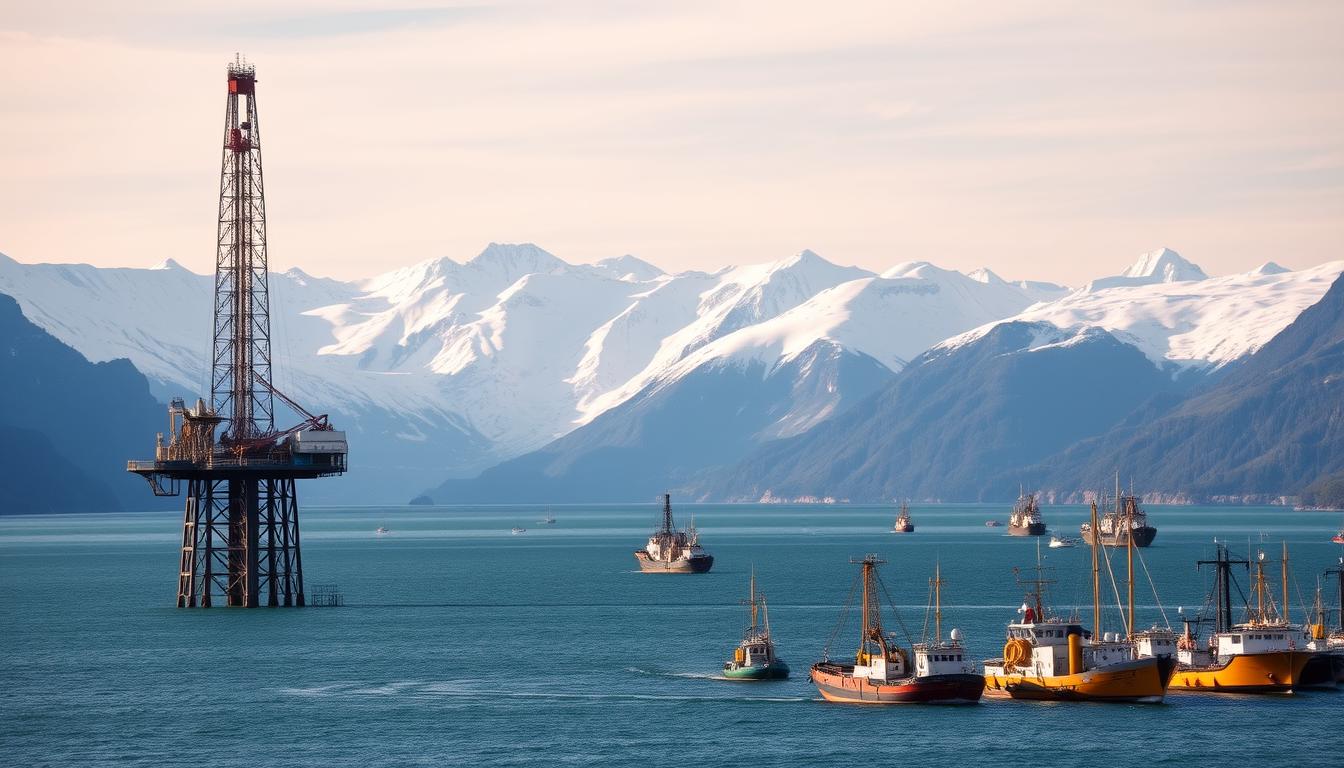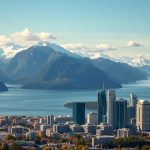In Norway, the main income comes from the petroleum sector. This industry is key to our national revenues and shapes our economy. Statistics Norway shows that oil and gas extraction are vital, making up a big part of our income.
Reports from the Organisation for Economic Co-operation and Development (OECD) and the Norwegian Petroleum Directorate highlight the sector’s role. They show how it boosts Norway’s economy and growth. Understanding our main income streams helps us see the prosperity of this nation.
Overview of Norway’s Economy
Exploring Norway’s economy, we find key aspects like economic indicators, GDP, and employment rates. This overview shows Norway’s financial strength and stability. It’s shaped by various sectors and a strong welfare system.
Key Economic Indicators
Norway’s economic indicators show the health of its economy. The inflation rate is stable, helping with predictable policies. Recent data shows a modest GDP growth, showing resilience against global pressures.
The Bank of Norway and the International Monetary Fund (IMF) watch these indicators closely. They ensure transparency and help with informed decisions.
GDP Composition
Looking at GDP composition gives us a deeper look at Norway’s economic activities. The energy sector, mainly oil and gas, boosts Norway’s GDP. Maritime and shipping, fisheries, and aquaculture also play big roles.
These sectors show how different areas of the economy affect our overall picture.
Employment Rates
Norway’s employment statistics show a low unemployment rate, thanks to a strong labour market. The mix of public and private sectors offers job security. This variety of jobs shows Norway’s workforce is adaptable and supports families and economic growth.
| Indicator | Value | Year |
|---|---|---|
| GDP Growth Rate | 3.4% | 2023 |
| Inflation Rate | 2.1% | 2023 |
| Unemployment Rate | 4.2% | 2023 |
Major Industry Sectors in Norway
Norway’s economy is strong thanks to several key sectors. Oil and gas extraction is a major player, bringing in a lot of money. The maritime industry, including shipping and naval engineering, shows Norway’s long history at sea.
Fisheries and aquaculture are also important, supporting coastal communities and providing top-notch seafood worldwide. The renewable energy sector is focused on a green future, meeting global sustainability goals.
Oil and Gas Extraction
The oil and gas sector is a big part of Norway’s economy, making up a lot of its exports. With huge reserves in the North Sea, Norwegian companies have grown and improved their skills. They invest in offshore drilling, making Norway a big player in the global market.
This industry boosts national income, creates jobs, and helps other sectors grow.
Maritime Industries
The maritime industry is key to Norway’s identity, connecting it to its seafaring past. It includes shipping, seafood processing, and naval engineering. Norwegian shipping companies are known for their green innovations.
This industry supports thousands of jobs and is a big part of Norway’s exports. It shows the country’s ability to adapt and thrive in a changing world.
Fisheries and Aquaculture
Fisheries and aquaculture are vital to Norway’s economy, providing jobs and quality seafood. Norway is a top fishing nation, committed to sustainable fishing. Its long coastline and cold waters are perfect for farming fish like salmon.
This sector helps ensure food security and strengthens coastal communities.
Renewable Energy Sector
Norway’s renewable energy sector is growing, focusing on hydropower, wind, and solar. Norway is a leader in hydropower, using its mountains and water. The government aims to cut carbon emissions, investing in green energy.
The Oil and Gas Industry
The oil and gas industry is key to Norway’s economy. It boosts GDP and creates jobs. But, it also raises environmental concerns.
Contributions to GDP
The oil and gas sector greatly affects Norway’s GDP. It has been a major source of income for the country. The Ministry of Petroleum and Energy says it helps fund public services and infrastructure.
Employment Opportunities
Jobs in the oil sector are vital for Norway’s economy. It supports thousands of jobs directly and indirectly. There are many roles, from engineering to logistics, showing a strong demand for skilled workers.
Environmental Concerns
While the industry brings economic benefits, it also has environmental drawbacks. It can pollute water, release greenhouse gases, and harm habitats. Friends of the Earth Norway stresses the need for sustainable practices to lessen these impacts.
The Maritime Sector
The maritime sector in Norway is key to our economy. With a long history and a strategic spot on the North Atlantic, Norway leads in shipping and maritime services. This part looks at the main parts of this sector, like shipping, shipbuilding, and services.
Shipping and Transport
Shipping in Norway helps trade reach global markets. Our long coastline and well-built ports make moving goods easy. Norway is among the top in shipping, with a lot of imports and exports by sea. We focus on making shipping greener and more efficient.
Shipbuilding Industry
The shipbuilding in Norway is known for quality and new ideas. We have top-notch facilities for all kinds of ships, from fishing boats to big offshore projects. Our skilled workers, cutting-edge tech, and green practices make us leaders in shipbuilding. We keep up with safety and green rules to stay ahead.
Related Services
The maritime services sector is a big part of Norway’s sea activities. Our companies offer important help like logistics, upkeep, and tech solutions. From special repairs to full supply chains, these services make shipping and shipbuilding better. Working together, we keep getting stronger in the sea world.
| Area | Key Features | Importance |
|---|---|---|
| Shipping Transport | Extensive coastline, advanced ports | Facilitates international trade |
| Shipbuilding Industry | Quality craftsmanship, innovation | Supports economic growth and job creation |
| Maritime Services | Logistics, maintenance, technical support | Enhances operational efficiency |
Fisheries and Aquaculture
The fisheries and aquaculture industry in Norway is key for the economy and local communities. It supports people’s lives and helps keep the environment healthy. We see how important it is for the economy and for keeping our oceans safe.
Importance to Local Communities
This sector is vital for local communities, providing jobs and boosting regional growth. Coastal towns flourish because of fishing and aquaculture. It gives them a sense of identity and cultural heritage.
It also encourages teamwork and gives locals a big role in managing resources. This makes sure everyone is involved in taking care of the sea.
Economic Contributions
The aquaculture industry is a big part of Norway’s economy. In 2022, about 62% of seafood exports came from aquaculture, with salmon leading the way. This sector adds billions to the GDP, showing its value in trade and supporting local businesses.
Sustainability Practices
As we face environmental issues, Norway’s fishing and aquaculture sector is committed to sustainability. They use responsible breeding, restore habitats, and follow strict rules. This keeps the fisheries productive and the environment healthy.
By focusing on sustainability, we protect this important industry for the future. It also meets the needs of the global market.
Renewable Energy Development
Norway is a leader in finding sustainable energy solutions. The country’s natural resources help a lot with renewable energy. We’ll look at how hydropower and wind energy are growing, and how they might shape the future.
Growth of Hydropower
Hydropower is key to Norway’s renewable energy. Over 1,300 plants make about 95% of the country’s electricity. This growth is important for a sustainable future. New tech and projects are being added to help.
Wind Energy Expansion
Wind energy is also growing fast in Norway. In the last ten years, it has tripled. Coastal areas are perfect for new wind farms because of the strong winds.
Future Potentials
Norway’s renewable energy future looks bright. With more focus on clean energy, Norway is well-placed. Research aims to link hydropower and wind energy better, making the energy system stronger.
| Energy Source | Current Capacity (GW) | Projected Growth (2025) |
|---|---|---|
| Hydropower | 31 | 32 |
| Wind Energy | 1.4 | 5 |
Role of Technology in the Economy
Technology in Norway is changing the economy in big ways. Start-ups and digital services are growing, making things more efficient and innovative. This section looks at how start-ups, digital services, and new tech are changing old industries.
Start-ups and Innovation
Oslo and Bergen are hubs for start-ups in Norway. They create new ideas that change industries. Funding from Innovation Norway helps these start-ups grow. This attracts talent and boosts the economy.
Digital Services Growth
Digital services are key for both people and businesses in Norway. From online shopping to fintech, tech is advancing fast. Mobile apps and easy-to-use websites make things better for everyone. This leads to businesses looking for ways to be more efficient and competitive.
Impact on Traditional Industries
Technology is changing old industries too. Companies in manufacturing and farming use new tech to work better and be greener. Automation and data help make smarter choices, leading to more profit and less harm to the environment.
Using technology makes Norway’s economy stronger and opens doors for more progress. The mix of new and old businesses keeps Norway at the forefront of innovation.
The Impact of Tourism
Tourism in Norway is key to our economy. It showcases our diverse landscapes and rich culture, drawing millions each year. By looking at key spots, we see how tourism helps local areas and boosts the economy. Yet, seasonal ups and downs can shake the industry.
Key Tourism Destinations
Norway has many places that tourists love. From the stunning fjords to the lively cities, there’s a lot to see:
- Oslo – the vibrant capital, known for its museums and modern architecture.
- Bergen – famed for its picturesque harbour and as a gateway to the fjords.
- Flåm – known for its stunning railway and as a starting point for fjord tours.
- Stavanger – renowned for its proximity to the iconic Preikestolen (Pulpit Rock).
- Tromsø – a city in the Arctic, popular for viewing the Northern Lights.
Economic Contributions
Tourism’s economic benefits are huge. Statistics Norway shows the big money coming in from visitors. Tourism creates lots of jobs, helping many sectors grow. This includes hotels, transport, and local shops that do well when tourists come.
| Year | Visitor Numbers | Earnings (in NOK) | Jobs Created |
|---|---|---|---|
| 2019 | 10.6 million | 118 billion | 214,000 |
| 2020 | 4.1 million | 45 billion | 102,000 |
| 2021 | 6.3 million | 73 billion | 150,000 |
Seasonal Challenges
Though tourism boosts our economy, we face seasonal hurdles. Summer is our busiest time, bringing in lots of money. Winter is great for sports and activities. But, off-peak times can really hurt local businesses and jobs.
The Role of Financial Services
The financial services in Norway are key to the economy. They offer banking, payment processing, and investment opportunities. These services help both local and foreign businesses understand and use the benefits they provide.
Overview of Financial Services in Norway
Our financial services sector is known for its strong rules. These rules help keep things stable and clear. The Financial Supervisory Authority of Norway is key in this area. Banks like DNB and Norges Bank offer a wide range of services, helping the economy grow.
Banking and Payment Processing
Banking in Norway has both old and new options. This meets the changing needs of people. The payment systems are also top-notch, with lots of mobile and contactless payments. This makes handling money easy for everyone.
Investment Opportunities
Norway has many chances for investment, like in green energy and tech startups. The economy is stable, and there’s a big push for new ideas. This makes Norway a great place for investors looking to grow their money.
| Service Type | Description | Key Players |
|---|---|---|
| Banking | Traditional and digital banking services | DNB Bank, SpareBank 1 |
| Payment Processing | Mobile and internet payment solutions | Vipps, BankAxept |
| Investment Services | Wealth management and asset management | DNB Invest, KLP Kapitalforvaltning |
LerriHost’s Services for Businesses
Starting a business in Norway comes with its own set of challenges and opportunities. At LerriHost, we offer detailed solutions to help with company formation and nominee services. Our team is well-versed in Norwegian laws, ensuring every step is smooth and accurate.
Company Formation Introduction
Setting up a company in Norway is a key step. LerriHost makes this easier by helping clients meet legal needs. Our team knows the Norwegian Company Register well, ensuring all documents are done right.
We support different business types, helping entrepreneurs pick the best fit for their goals.
Nominee Services Introduction
Our nominee services are perfect for those wanting a local presence without direct involvement. Using nominee directors and shareholders helps keep things private while meeting legal standards. This lets clients concentrate on their main work while we handle the details.
Enhancing Online Presence
In today’s digital world, having a strong online presence is key for businesses. At LerriHost, we offer solutions to boost visibility, improve user experience, and ensure site functionality. We focus on SEO for WordPress to increase website rankings. We also provide top-notch website design and redesign services to meet your business needs.
Our WordPress maintenance and hosting services give the ongoing support your site needs. This keeps your online platform effective and running smoothly.
SEO for WordPress
Effective SEO for WordPress is vital for attracting organic traffic. Our strategies include keyword optimisation, content improvement, and link-building. These efforts help improve your site’s search engine rankings and keep content engaging for users.
WordPress Design and Redesign
We know how important a good website design is. Our team works closely with clients to create sites that are both beautiful and user-friendly. Whether you need a new site or a redesign, we ensure it reflects your brand and meets your goals.
WordPress Maintenance and Hosting
Regular WordPress maintenance is critical for your site’s performance and security. Our hosting services offer reliable support with features like backups, updates, and security monitoring. This lets you focus on your business while we handle your website’s upkeep.
Challenges Facing Norway’s Economy
We face many challenges in Norway’s economy that need careful look. A big worry is our long oil dependency. This affects our wealth and makes us vulnerable to global market changes. We will explore these key issues.
Dependence on Oil
Our economy heavily relies on oil, which is a big part of our GDP and exports. This oil dependence makes us shaky as global energy markets change. Price swings hit our government’s budget and public services hard.
We need to move away from fossil fuels and find new ways to earn money. This will help us deal with future economic problems.
Global Economic Trends
The global economy’s ups and downs add to our worries. Political tensions and trade rules can make things uncertain for Norwegian businesses. Changes in oil demand, renewable energy, and how people shop can also hurt our exports.
It’s vital to keep up with these global changes to stay stable and grow. By tackling these issues, we can make our economy stronger for the future.
Conclusion
We’ve looked at Norway’s economy in detail. It’s shaped by key sectors like oil and gas, maritime shipping, fisheries, and renewable energy. These areas are vital for the country’s GDP and support many people’s jobs.
The connection between these industries shows Norway’s economy is strong and flexible. It can handle changes well.
Now, let’s think about what the future holds for Norway’s economy. The country is moving towards more sustainable and renewable energy. This means we’ll see more green technologies and new ways to make money.
But, there are also global economic challenges to face. Norway will need to find new ways to stay stable and grow.
In summary, Norway’s economy is strong and ready for the future. It’s a mix of old and new industries. This mix is good for growth and keeping the economy stable.
We’re hopeful about Norway’s future. It’s well-positioned to succeed in a changing world.







